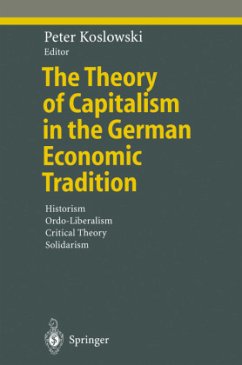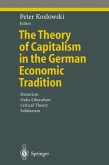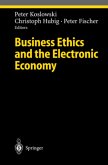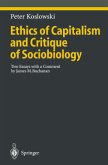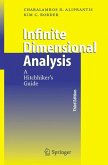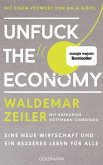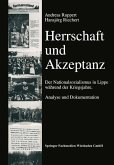The German tradition of economics has been occupied with the topic of capitalism. The intellectual debate about the theory, critique, and reform of capitalism has not only been at the center of Marxist thought but also of the economics of the Historical School, of Ordo-Liberalism, the Frankfurt School, and Solidarism. The competition between different models of capitalism in the world is one of the important issues of the contemporary debate in economics and politics. The book provides the reader with theoretical foundations for this debate. It offers an introduction to central economic thinkers of capitalism and of the market economy coming not only from the tradition of liberalism but also from alternative traditions. The book gives a comprehensive view of the achievements, problems, and outlooks of capitalism.
The theory of capitalism and of the economic order is the central topic of the German economic tradition in the 20th century. Capitalism has not only been the topic for Marxist economics and for the Frankfurt School but also for the Historical School and for the postmarxist theory of capitalism in Ordo- and Neo-Liberalism as well as in Solidarism. The question of the foundations of the economic order of the market economy and of capitalism as well as the problem whether a third path between capitalism and social ism is possible occupied this tradition from the Historical School to Ordo Liberalism and the theory of the social market economy. The theory of capitalism and of the social market economy as well as the critique and reform developed in this theoretical tradition is important for the theory of economic systems as well as for today's problems of the eco nomic order. Its relevance for the present world economy is visible in the discussions whether there exist different models of capitalism and whether they can be described as the Anglo-American and as the Rhenish model of capitalism influenced by the thought of the German economic tradition. Michel Albert, the author of this classification, gave the key-word in his book Capitalism against Capitalism. The papers of this book can help to clarify this debate by giving a first hand introduction to some of the main economic thinkers of capitalism.
The theory of capitalism and of the economic order is the central topic of the German economic tradition in the 20th century. Capitalism has not only been the topic for Marxist economics and for the Frankfurt School but also for the Historical School and for the postmarxist theory of capitalism in Ordo- and Neo-Liberalism as well as in Solidarism. The question of the foundations of the economic order of the market economy and of capitalism as well as the problem whether a third path between capitalism and social ism is possible occupied this tradition from the Historical School to Ordo Liberalism and the theory of the social market economy. The theory of capitalism and of the social market economy as well as the critique and reform developed in this theoretical tradition is important for the theory of economic systems as well as for today's problems of the eco nomic order. Its relevance for the present world economy is visible in the discussions whether there exist different models of capitalism and whether they can be described as the Anglo-American and as the Rhenish model of capitalism influenced by the thought of the German economic tradition. Michel Albert, the author of this classification, gave the key-word in his book Capitalism against Capitalism. The papers of this book can help to clarify this debate by giving a first hand introduction to some of the main economic thinkers of capitalism.

Das zentrale Thema in der deutschen Ökonomie des 20. Jahrhunderts
Peter Koslowski (Herausgeber): The Theory of Capitalism in the German Economic Tradition. Springer-Verlag, Berlin/Heidelberg 2000, 575 Seiten, 189 DM.
Die Theorie des Kapitalismus ist nach Peter Koslowski, Direktor des Centrums für Ethische Ökonomie und Wirtschaftskultur des Forschungsinstituts für Philosophie in Hannover, das zentrale Thema in der deutschen ökonomischen Tradition des zwanzigsten Jahrhunderts. Für die marxistischen Wirtschaftswissenschaftler und die Frankfurter Schule sei der Kapitalismus ebenso der Hauptuntersuchungsgegenstand gewesen wie für die Historische Schule der deutschen Nationalökonomie, für die postmarxistische Theorie des Ordo- und Neoliberalismus sowie für den Solidarismus, allgemein bekannt als katholische Soziallehre, die Koslowski allumfassend als "Christian Social Thought" bezeichnet.
Wegen dieser inhaltlichen Breite vereinigt der Tagungsband eine Reihe von sehr unterschiedlichen Beiträgen zu den genannten Denkschulen, die entsprechend dem gesamten Forschungsprojekt "Economics and Ethics in the Historial School - Achievements and Present Relevance" noch durch Ausführungen zur Interpretation des japanischen Kapitalismus in historischer Perspektive (Kichiro Yagi, Kyoto), zur Historischen Schule in Schweden (Hans de Geer, Stockholm), zum Historismus im Wirtschaftsrecht (Sibylle Hofer, Frankfurt), zu Karl Poppers Kritik am Historizismus (Adam Chmielewski, Breslau) und zur Historismus-Relativismus-Debatte in der deutschen Nationalökonomie im späten neunzehnten Jahrhundert (Annette Wittkau-Horgby, Hannover) ergänzt werden.
Durch biographisch unterlegte Beiträge zu Werk und Methode von Walter Eucken (Helge Peukert, Frankfurt), Franz Böhm (Knut Nörr, Tübingen) und Alfred Müller-Armack (Christian Watrin, Köln) wird vor allem der Ordo- und Neoliberalismus ausführlich in einen kritischen Bezug zur Historischen Schule gesetzt. Zudem grenzen Manfred Streit und Michael Wohlgemuth vom Max-Planck-Institut zur Erforschung von Wirtschaftssystemen in Jena die neoliberale Konzeption Friedrich August von Hayeks von ordoliberalen Vorstellungen ab - im Hinblick auf die unterschiedlichen Bewertungen von Wettbewerb, institutionellem Wandel und sozialer Gerechtigkeit.
Diese Ausführlichkeit wäre auch der Erörterung der Kapitalismuskritik der Frankfurter Schule dienlich gewesen. Mit nur einem Beitrag zur frühen Frankfurter Schule (Harry Dahms, Florida State University) wird der Sammelband der Bedeutung dieser Denkschule, welche die öffentlichen und oft kapitalismuskritischen Debatten in der Bundesrepublik Deutschland bis in die neunziger Jahre maßgeblich beeinflußt hat, nicht einmal annähernd gerecht.
NORBERT TOFALL
Alle Rechte vorbehalten. © F.A.Z. GmbH, Frankfurt am Main
Perlentaucher-Notiz zur F.A.Z.-Rezension
Norbert Tofall erläutert zunächst, dass für den Herausgeber der Kapitalismus das "zentrale Thema in der deutschen ökonomischen Tradition des zwanzigsten Jahrhunderts" ist: Ob Frankfurter Schule, Ordo- und Neoliberalismus oder katholische Soziallehre - der Kapitalismus ist überall von vorherrschender Bedeutung. Und so ist auch der Band nach Tofall geprägt von einer großen Bandbreite, die sogar Beiträge zum Kapitalismus in Japan oder Schweden und zahlreiche biografische Beiträge umfasst. Mit einer Wertung hält sich der Rezensent weitgehend zurück. Lediglich zur Frankfurter Schule hätte er sich mehr als nur einen Beitrag gewünscht, zumal deren Einfluss bis in die neunziger Jahre hinein von erheblicher Bedeutung für die "kapitalismuskritischen Debatten in der Bundesrepublik Deutschland" gewesen sei.
© Perlentaucher Medien GmbH
© Perlentaucher Medien GmbH

